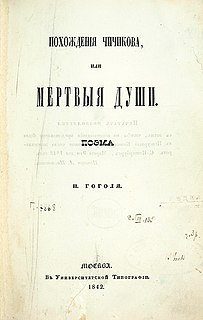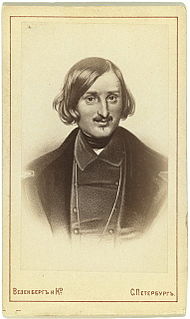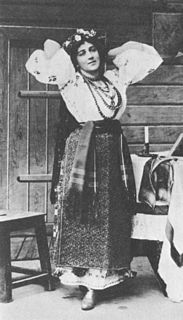This page is based on this
Wikipedia article Text is available under the
CC BY-SA 4.0 license; additional terms may apply.
Images, videos and audio are available under their respective licenses.

Nikolai Vasilievich Gogol was a Russian dramatist of Ukrainian origin.

Dead Souls is a novel by Nikolai Gogol, first published in 1842, and widely regarded as an exemplar of 19th-century Russian literature. Novel chronicles travels and adventures of Pavel Ivanovich Chichikov and the people whom he encounters. These people are typical of the Russian middle-class of the time. Gogol himself saw it as an "epic poem in prose", and within the book as a "novel in verse". Despite supposedly completing the trilogy's second part, Gogol destroyed it shortly before his death. Although the novel ends in mid-sentence, it is usually regarded as complete in the extant form.
The nose is a protuberance in vertebrates which admits and expels air for respiration and contains olfactory receptors for sensing odors.
Dead Souls is a novel by the Russian author Nikolai Gogol.

This is a list of the works by Nikolai Gogol (1809–52), followed by a list of adaptations of his works:
Taras Bulba is an historical novel by Russian-Ukrainian writer Nikolai Gogol.

Chlestakows Wiederkehr, op.149, is an opera in three acts by Giselher Klebe. He also wrote the libretto, based on the play Der Revisor by Nikolai Gogol. The work lasts about 70 minutes.

Christmas Eve, is an opera in four acts with music and libretto by Nikolai Rimsky-Korsakov. Composed between 1894 and 1895, Rimsky-Korsakov based his opera on a short story, "Christmas Eve", from Nikolai Gogol's Evenings on a Farm Near Dikanka. The story had been used as the basis for an opera at least three times previously, including for Tchaikovsky's Vakula the Smith (1874). Oliver Knussen writes that "Rimsky is only interested in recreating the atmosphere of the folk-tale, fleshing it out for his stage pageant in a comparable way to Humperdinck in Hansel. Gerald Abraham, on the other hand, praises the vivid humanity and humour of Rimsky's setting, as well as its atmospheric strength.
Dalia Ibelhauptaite is a Lithuanian opera, theatre, and film director and playwright, whose work combines the traditions of Russian and Western theatre.

The Marriage is a comic opera in 2 acts by Bohuslav Martinů, to the composer's own libretto, after the play of the same name by Nikolai Gogol. The opera was commissioned for television by the NBC, and the NBC Opera Theatre performed the work's world premiere on their television program NBC TV Opera Theatre for a national broadcast in the United States on 2 July 1953. The opera has subsequently been adapted for the stage and recorded on CD.
Literaturoper is opera with music composed for a pre-existing text, as opposed to an opera with a libretto written specifically for the work.
Christmas Eve is the evening or day before Christmas Day, occurring on December 24 in Western Christianity and the secular world.
Shponka and His Aunt is an opera in one act by composer Anastasia Bespalova. The opera uses a Russian libretto by Arkady Zastyrets which is based upon the story of the same name by Nikolai Gogol. The opera was commissioned by the Mariinsky Theatre along with two other new operas, Svetlana Nesterova's The Lawsuit and Vyacheslav Kruglik's The Carriage, all based on stories by Gogol. The three operas premiered together on 21 June 2009 during the Mariinsky Theatre's summer festival.
The Carriage is an opera in one act by composer Vyacheslav Kruglik. The opera uses a Russian libretto by Vera Kupriyanova and the composer which is based upon the story of the same name by Nikolai Gogol. The opera was commissioned by the Mariinsky Theatre along with two other new operas, Svetlana Nesterova's The Lawsuit and Anastasia Bespalova's Shponka and His Aunt, all based on stories by Gogol. The three operas premiered together on 21 June 2009 during the Mariinsky Theatre's summer festival.

Alireza Koushk Jalali, is an Iranian theatre director and playwright. Currently he resides in Cologne, Germany, where he also made his first German production in 1986.
The Gamblers, Op. 63, is an unfinished opera by Dmitri Shostakovich, to his own libretto based on Nikolai Gogol's comedy The Gamblers (1842). The surviving first act lasts around 47 minutes.
Dead Souls is a 1976 Russian-language opera in three acts by Rodion Shchedrin based on the verse-novel Dead Souls by Gogol, to a libretto by the composer. It was premiered at the Kirov in 1977, and overseas in Boston in 1988.

The Diary of a Madman is a one-act chamber opera by the composer Humphrey Searle. It is based on the short story of the same name by Nikolai Gogol. The opera was premiered in 1958 in Berlin. The libretto is by the composer.








